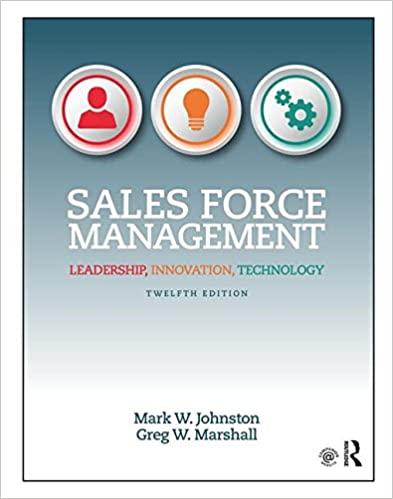Thad Williams had the kind of problem many sales managers wish they could experience more often. He
Question:
Thad Williams had the kind of problem many sales managers wish they could experience more often. He just came out of a strategic planning meeting with senior management at his company, Logistics Logic (a leading supplier of logistics solutions for manufacturing companies). The emphasis in many organizations on supply chain management had created huge demand for the products and services offered by Logistics Logic. Started by Eric Lemaster in 1985 and originally based in London, the company had developed an excellent reputation by helping companies become more efficient and effective in managing the flow of goods in and out of the organizations. Logistics Logic worked with key players in the supply chain management industry (FedEx, UPS, DHL, and others) to develop custom-designed hardware and software for unique logistics solutions. The company had found a great niche for its products by focusing on medium-sized companie around the world.
Thad had been with the company for 10 years and worked his way up to vice president of sales. In the last 15 years the company had experienced huge growth in Asia. As result, while maintaining offices in London, Mr. Lemaster decided to move Logistics Logic’s senior management and operations to Hong Kong in 2001. Revenue exceeded $350 million last year, and the company had a worldwide sales force of 150. At this meeting, Thad had been given the go-ahead to hire 20 new salespeople, primarily in Asia. This would represent one of the largest increases of salespeople in the company’s history and was based on the goal of taking the company to $400 million in the next two years.
The typical salesperson was a male in his early 40s with a technical background in logistics. Interestingly, however, Thad had noticed that most of the new salespeople (those hired in the last three years) were women (7 out of 10). Salespeople needed a very good knowledge of logistics and the fundamentals of contemporary selling. The compensation system allowed salespeople to earn a good living, with many earning in excess of $125,000 per year.
Thad had also noticed the typical customer had changed in recent years. When he started, customers were often men in their 50s who had little formal education in logistics. Now customers were most often experienced men and women with formal training in supply chain management.
Logistics Logic, and more specifically Thad Williams, knew the company’s new salespeople were critical to the organization’s continued success. The question was, what would make a successful Logistics Logic salesperson now?
Questions
1. What qualities and characteristics do you think are important for a new salesperson at Logistics Logic? Why?
2. What kind of person would you recruit (experienced versus less experienced, age, education, background, etc.)?
Step by Step Answer:

Sales Force Management Leadership Innovation Technology
ISBN: 9781138951723
12th Edition
Authors: Mark W. Johnston, Greg W. Marshall





